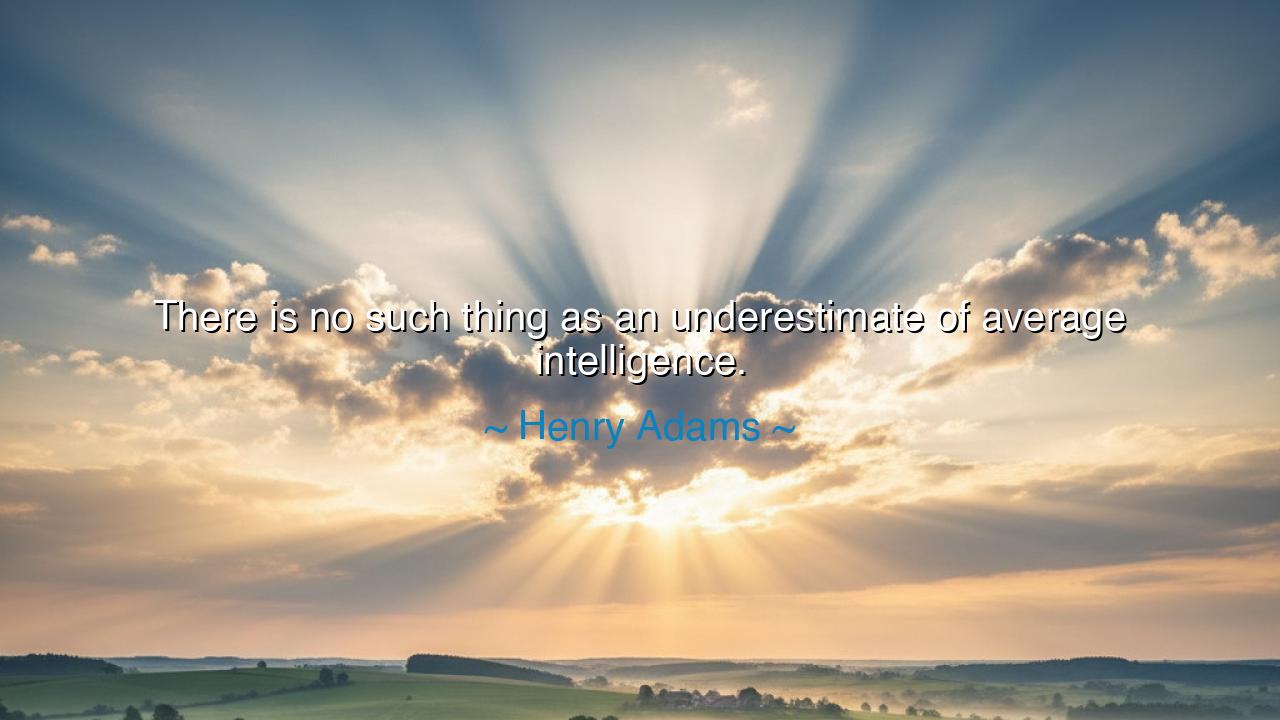
There is no such thing as an underestimate of average






“There is no such thing as an underestimate of average intelligence.” Thus declared Henry Adams, the American historian, thinker, and observer of civilization’s rise and decay. His words, sharp as a sword and sorrowful as a bell, speak not only of intellect but of human nature itself. Beneath this irony lies a deep lament — a recognition that the masses, so often guided by habit, comfort, and illusion, rarely rise to the height of wisdom. Adams does not mock humanity; he warns it. He speaks as one who has seen empires crumble, not by war or famine alone, but by the slow decay of thought, by the failure of men and women to question, to reason, and to awaken.
In the age of Henry Adams, the world was changing swiftly. Industry roared, machines multiplied, and nations began to worship progress without understanding its price. Adams, a descendant of two American presidents, lived at the turning point between old virtue and new ambition. He watched with disquiet as civilization, clothed in the brilliance of invention, began to forget the discipline of wisdom. His remark that there is “no such thing as an underestimate of average intelligence” came not from scorn, but from sorrow — for he saw how easily the crowd could be deceived, how swiftly it could follow voices that promised ease over truth.
To underestimate average intelligence is, in Adams’ view, impossible because too often people choose ignorance over effort, appearance over understanding. He saw that complacency is the true enemy of intelligence. When men cease to think deeply, they become prey to falsehood. When nations cease to question their leaders, they surrender freedom. Adams’ insight strikes like a warning bell through the corridors of time: that civilization itself stands always on the edge of decline, not because of malice or disaster, but because of the quiet slumber of the mind.
History gives us proof enough. Consider the fall of ancient Rome, that mighty empire whose wisdom and art once dazzled the world. Its citizens grew wealthy, then idle; its leaders greedy, then corrupt. Bread and games replaced duty and reflection. The people ceased to think for themselves, content to be fed and entertained, until the empire that ruled the world crumbled from within. The barbarians at the gates were not the cause, but the consequence. Rome had first been conquered in spirit — by its own failure to think. Adams’ words, written centuries later, echo this same truth: that ignorance in the many makes tyranny in the few inevitable.
Yet within this dark mirror there shines a faint light. Adams, though cynical in tone, invites us to rise above mediocrity — to cultivate the intelligence that questions, the courage that reflects, the wisdom that doubts. He reminds us that true intelligence is not measured by schooling or eloquence, but by the ability to see clearly, to resist deceit, and to pursue understanding over comfort. To live wisely is to think independently, to test what is told, and to seek truth even when it is bitter.
The lesson, then, is both humbling and empowering: never be an average mind. The average mind consumes but does not contemplate, speaks but does not listen, believes but does not discern. To rise above this, one must train the intellect as a warrior trains his arm — through discipline, humility, and the pursuit of knowledge. Read deeply, observe quietly, question boldly. Do not be satisfied with slogans or appearances; seek the roots beneath the soil, the cause beneath the event, the motive behind the word.
Let each person who hears Adams’ warning remember this: civilizations are built by the few who think, but they are destroyed when the many refuse to. The world will always have its noise, its easy answers, its comforting illusions — but the wise must walk another road. They must carry the torch of critical thought, for without it, darkness returns.
Thus, Henry Adams’ words endure not as mockery but as a challenge: to awaken the sleeping mind, to honor the gift of reason, and to remember that intelligence, when left unused, becomes the seed of ruin. Let us, then, strive to be more than average, to think beyond ourselves, and to keep the flame of wisdom alive — for only in thought, tested and true, does humanity find its salvation.






AAdministratorAdministrator
Welcome, honored guests. Please leave a comment, we will respond soon